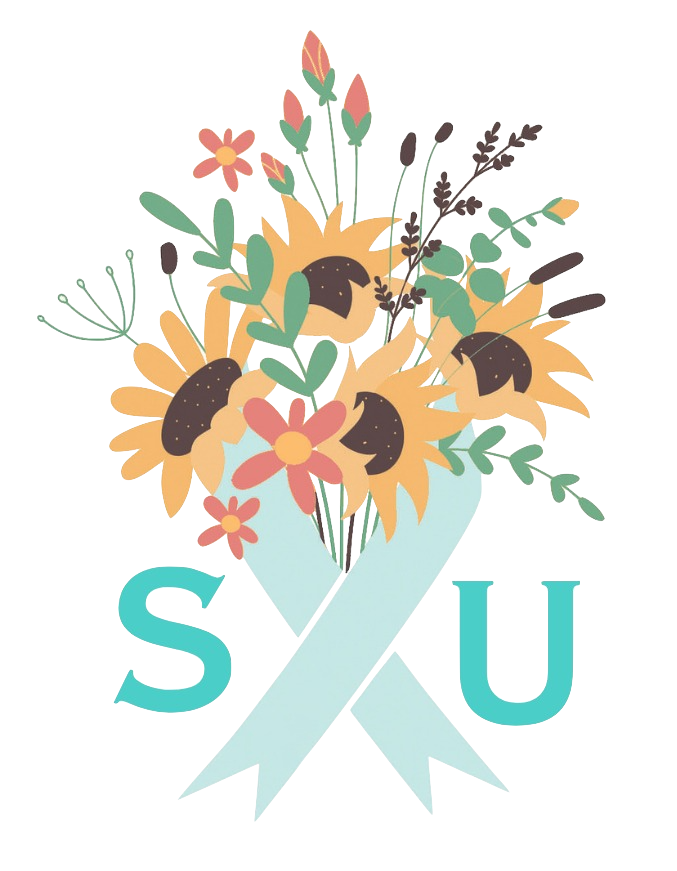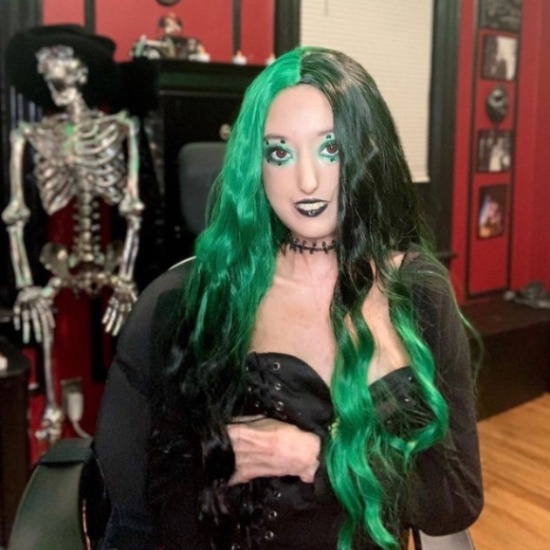Shirley Alvarez
SHIRLEY ALVAREZ
Scleroderma Stories Issue 2
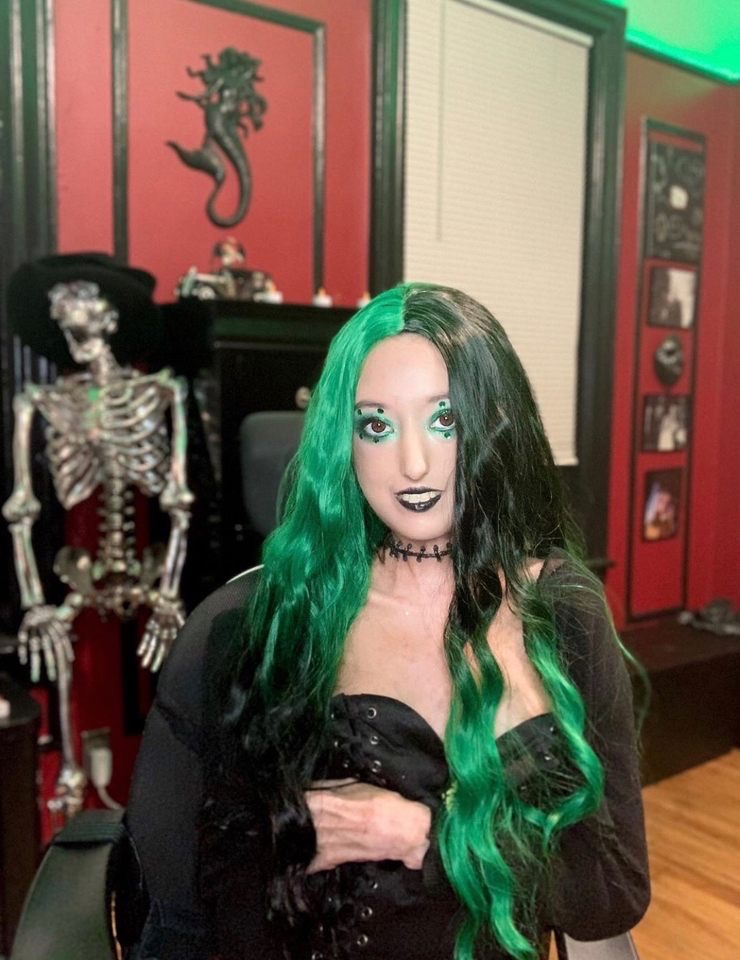
I’m really thankful to do this interview because I’m always a little bit private about my life. Sometimes, when I talk about scleroderma, it really does bring back a lot of memories that can make me a little bit upset. But, I think it’s really nice to reflect and to share my story with others, and to hopefully help somebody that’s going through something, so I’m very grateful for the opportunity.
Please introduce yourself
My full name is Shirley Alvarez, and I am 29 years old. I’m a regular girl trying to make the most out of life. I was diagnosed very early on with scleroderma at the age of 9. I’ve been trying to cope with that and have a creative life, so it’s been a long journey, but I think I’m doing okay overall while trying to make the best of it.
What are you passionate about?
I love music; music is my life. I’ve also always been very passionate about the arts. Before I was diagnosed with scleroderma, I was always a dancer, and I would be dancing day and night. I remember being a kid and wanting to be a dancer, so dancing was a huge part of my life.
After being diagnosed, I couldn’t do it anymore, and I became weaker over time; I couldn’t move my body the same. But, I discovered that there was still a way for me to dance, so even though I’m in a wheelchair, I figured out how to dance and just to start moving again. I found my first love and brought it back into my life, and I can say dancing is a big part of my life and is one of my biggest passions. I also love attending concerts, photography, and being creative when it comes to fashion and creating an outfit.
I’m all over the place. I love filmmaking and making videos. I create a lot of videos, including tributes to my favorite songs. I absolutely love making dancing videos to share with people because I really love to show my joy, and hopefully that can inspire them to feel that joy as well.
I’ve never been a person that was very articulate. I think for me, it was the arts where I communicate best, so when I dance or put on an outfit, I’m making a statement. When I show my photography and my model poses, I’m trying to tell a story; it’s more than a picture. I’m really trying to communicate something. I think it’s also interesting to see how people interpret the concept that I share, and I have overall positive feedback with a few negative ones, but it’s up to them how they want to see it, and I’m okay with that.

Do your hobbies help you deal with your scleroderma?
Oh, most definitely. I must be creative and artistic every day, even with the basics like getting ready in the morning and putting on makeup. It’s like your face is almost like a canvas.
Anything that I try to do, I try to just make something creative out of it, and music is a huge part of helping me cope. I can identify with songs with lyrics especially, and if I’m feeling a certain way, while connecting with the music, that really alleviates the soul. So music is definitely the main thing.
I’m also a visionary, so I really do love listening to music and visualizing myself, whether it’s performing or things as such, and then they give me ideas for videos. I’m always just constantly visualizing it; for me, it’s a therapeutic form. It’s been my therapy for as long as I can remember, and I think that’s what helps me continue being sane and accepting and just coping with everything.
It’s nice to have those outlets. I think we all need an outlet. We all need art in our lives to help us express when words fail, but also when there isn’t anybody around that can understand us. I think it’s really important to have some artistic form in your life.
When was your diagnosis, and what symptoms led up to it?
I was diagnosed on September 11th, 2000 after symptoms began to show up in the beginning of 2000 when I was in 5th grade. It started to worsen quickly. I remember traveling to South America with my mom, and after coming back from the trip, I wasn’t the same.
There were symptoms of fatigue. I do recall my parents saying that when I was sitting at the dinner table, I was always sighing, almost like I felt like I was exhausted. My mom always said, “You were always a very energetic child. Why are you looking so tired all the time?”
Another one that I noticed was a skin discoloration. I noticed that my skin was getting darker, and I was developing these dark spots on my joint areas. I remember developing one near my mouth. It happened the same day I was supposed to go to a friend’s party. I just noticed a dark patch near my lip.
Another thing that I noticed was just the weakening. I felt weaker in my legs, so when I was going to school and I was trying to climb up the stairs, I was having a really hard time. I really had to fake it and pretend that I was okay, but I think a lot of my friends noticed. They started carrying my backpack because they wanted to alleviate some of the weight that I was carrying, and that helped.
So I do remember all of those things before the actual diagnosis. I also remember getting a lot of nosebleeds in the mornings, and I was waking up with a swollen face. It looked like what they call the “moon face.” I do remember waking up and having a swollen face and also swollen hands.
I was scared to tell someone. I figured it was temporary; that it was going to go away soon. And I remember relatives just making it seem like, “Oh, maybe it’s like an allergy.”
I don’t recall, but one relative made it seem like it was just something that was going to pass. She offered to give me some hand cream that could help, and I took it, but no, I started to realize that it wasn’t getting any better. So for me, it was more I thought it was gonna go away soon. That’s why I didn’t tell anybody.
To what extent did you understand what scleroderma actually was at the time?
I had no idea what it was. I remember going into the doctor’s office, and I wasn’t in the room when he told my mom the diagnosis. I saw my mother just crying hysterically, like she couldn’t even stand. She really had to hold on to the wall because it was like the worst news of her life. I just remember seeing my mom crying, and I was like, “What’s going on? What’s going to happen to me?”
I really did not understand the nature of the disease just yet. It took some time to understand what was happening. But overall, I knew that it has to do with the skin. I felt the tightness and muscle aches, so that was a major aspect of the disease. I think it was the doctors who taught me more about it. I do remember looking it up, but to be honest with you, I didn’t want to read into it too much.
I didn’t want to have a lot of knowledge in my mind because I didn’t want to think about it and then cause my own symptoms by overthinking. I decided to just stay as distant as possible. I knew the basics. I knew the skin was involved, but I didn’t want to know how it could progress. I didn’t really want to know if it was fatal or not.
You know, there’s some things that I just didn’t want to know because I just didn’t want to have that in my conscious, and that’s what I did, at least when I was very young.
As you start getting older, you become more knowledgeable; you become more aware, and things have changed over time. When I was younger, I was still so young that I was just more preoccupied about just going, you know, one day at a time.
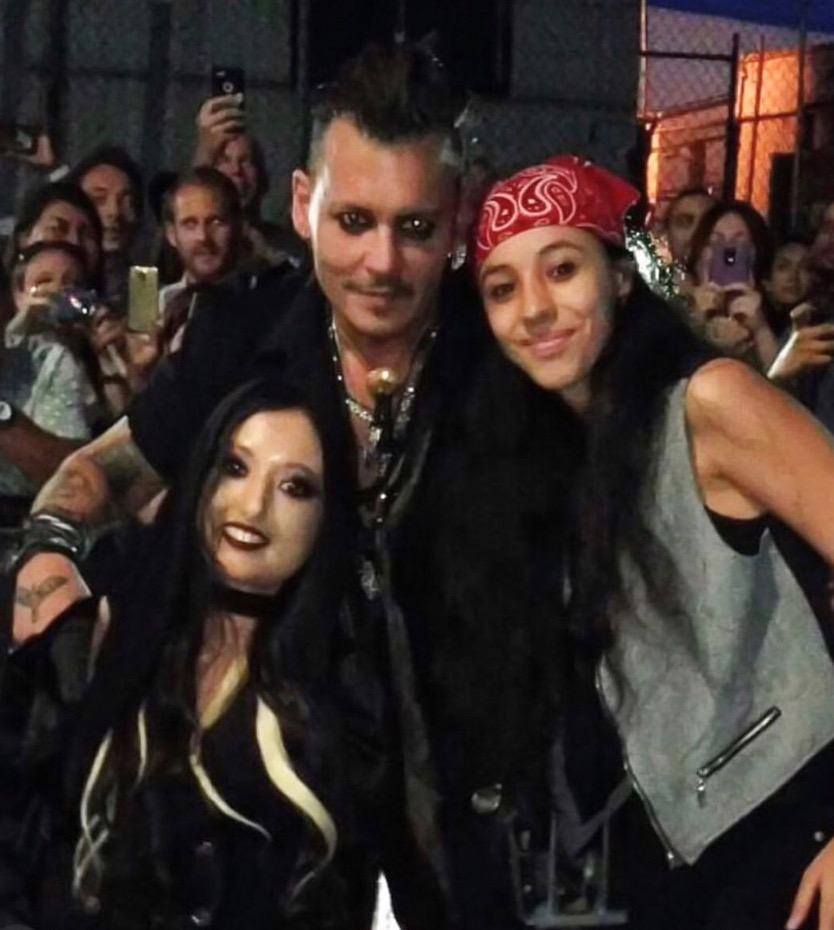
What symptoms have you developed since diagnosis?
I have the crest syndrome type of scleroderma. That includes the calcinosis, the Raynaud’s, the esophagus, and the dilated blood vessels that are on my face and my body. My fingers also became quite curved and claw-like. Losing a lot of weight, for me, has been the most difficult part of the disease and the bone and muscle mass that I lost. I think, for me, that’s what hit the hardest.
Another one that’s quite challenging is the dilated blood vessels that are noticeable on my face. Sometimes, honestly, I don’t want to wear makeup. And if I go out, people are like, “Oh my gosh, is that a rash, like is it contagious?” I just really can’t step out of the house without makeup, and of course family and friends understand it when I’m home. They don’t mind, you know. My family is used to it, and they don’t even notice it.
However, personally, that’s something that I still do notice, and it still bothers me until this day even though I try to be very positive, and I’ve created a persona out of my disease and I wear makeup. But sometimes, I really wish that I looked better when I’m natural – when I don’t have makeup on. But, it’s not everything. Looks are not everything.
How did these changes affect your ability to interact with your family, friends, school, and job?
When I was first diagnosed, I’d have to say my extended family wasn’t there. I actually felt like we were alone. I did feel like I had less interaction with family. People just seemed to distance themselves or didn’t know how to deal with it, and so it was really just myself and my immediate family: my parents, my sister, and my grandmother.
It changed in the sense of not having as much interactions with family and friends. I didn’t see friends for many years. I returned to my school, and I basically was living and hiding the first couple years. Also because I was just going to the hospital and getting treatments all the time, I really didn’t have time to see a lot of people anyway. I was just very much to myself, and it was just basically myself and my immediate family.
I was very lucky to go to a school that was for children with physical disabilities. It was a school that was very accessible and very accommodating to our needs. Fortunately, I was in an environment where I was with other kids who were dealing with similar situations. I was very lucky to be in that school, and that helped me so much. I was very much influenced by the children and how they were coping with their lives. That inspired me to have a better and more positive outlook.
As I got older, I didn’t think that I would be able to go to college, especially with relying on so many people and not really being as independent. Somehow, I made it work. I went for a semester, and then I switched to online classes, which was a huge advantage because that allowed me to work at my own pace and allowed me to travel and explore places on my own without having the school.
I was really able to do my work when I needed to and have the other time for socializing or traveling. I made my city my campus. I didn’t want to be inside a building. And so I accomplished that with the help of my parents and my aides at the time. I graduated college, and then the next goal was “well, will I be able to get a job?”
Luckily, I found something after many interviews. I had so many rejections, but I never stopped. I never stopped trying, and something came out of it. It took me about six months after graduation to land a temporary position. I really had to prove myself to the organization that I was able to do the job. After being there for a few months, I was hired permanently.
So it’s been challenging – very scary. Sometimes, the fear is what makes it worse. But once you’re out there, it’s not as bad as you think it is. I learned that, and I’m trying not to be fearful anymore and trying just really hope for the best.
Did your friends understand what you were going through?
I mean, you know, it was quite visible. I think we all, to a certain degree, understood what it’s like to be in a wheelchair and what it’s like when you need to go to the hospital to get treatment.
At the time, when it started, I was the only girl with scleroderma. So, I really did have to, you know, tell people about it. They had to be educated and understand what it was about. So yeah, it took some time for them to really understand it. But you know, it’s not something that I was focused on.
Everybody just treated me very well, and my nurses took care of me very well. It was a very nice environment to be in, and I felt that they did their best to accommodate for me. As long as I communicated my needs, they were accommodated.
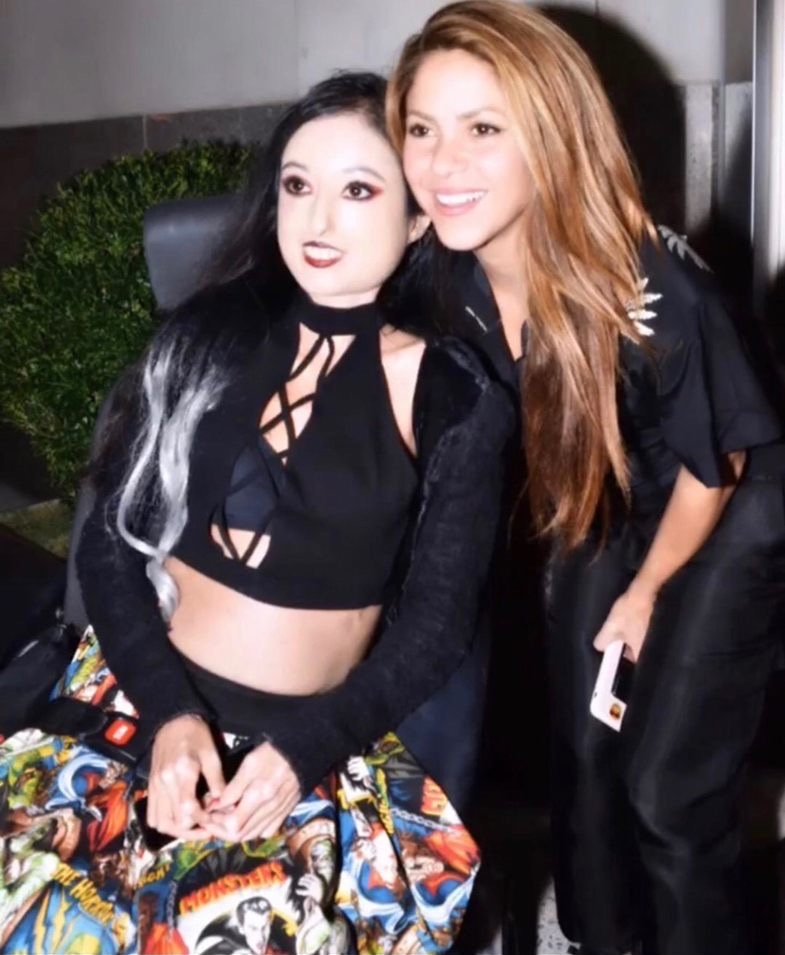
Is there a certain mindset with which you approach your scleroderma?
For me, this has been an absolute nightmare. That is the truth. I don’t sugarcoat it. It is an absolute nightmare. It’s been a nightmare everyday since day one, but I’ve also learned to see and acknowledge the nightmare as a blessing. So I always say I’ve been blessed with a nightmare. That is my life motto.
Without this nightmare, I wouldn’t have really realized my own strength. I wouldn’t have developed my sense of compassion and understanding. I think it’s also helped me be creative. I’ve been able to draw a lot of inspiration from my own life and put it into my work, film, photography, passion, and aesthetic. I feel that it’s been a blessing, and I’ve had experiences that many others haven’t. I embrace the unique experiences scleroderma has given me.
I realize that sometimes there may be a lot of darkness, around me, but I’m always like that light. I am that candle that lights up the darkness. I noticed that you are the light within, and I think that’s how I just been able to cope with the reality.
Is there anything in specific that gets you through the difficult times?
Music helps me get through the difficult times, but really just finding an outlet. If I’m feeling a certain way, I will put in and manifest all that energy into something, whether it’s dressing up or going to have a photoshoot.
And I’m really going to try to showcase what I’m feeling. I use color tones. If I’m feeling angry, you might see a red photoshoot. If I’m not feeling so positive, you’ll probably see some green. I also use a lot of black in my photography.
I do try to embrace the gothic aesthetic in my work and in my life, and that’s really helped me so much.
Do you have any goals or dreams for the future?
For my own future, I want to just be able to continue being creative. I go as @thetragicdoll on Instagram.
That’s an extension of myself, a character that I built, and that’s the way that I express myself. That is the way that I’m representing myself to the world: as a tragic doll that has different elements; there’s light and darkness as well as creepy and cute. I can play around with all these elements. That’s something I want to continue growing, inspiring other people to share through my story and through @thetragicdoll.
I also ideally would love to just be in a movie. I think a film would be amazing. I’m thinking about maybe directing a documentary one day or directing my own film one day. I also would love to be a director for music videos, since music and dancing are my passions. I absolutely love editing videos. I always wanted to create a story or direct a video that will give a song justice. I’m very much into the visuals of musical videos. That is another goal that I would like to achieve, whether it is creating my own production company or something else. That’s something that I am striving for.
And other than that, just to continue traveling and exploring the world and exploring myself. My family is very important, so to just continue being with them and experiencing life with them is also another one of my goals. I have a little brother who was just recently born, so he’s been my life right now. I’m very excited to see him for a while.

What medications have you taken and treatments have you done?
The only treatment I ever had was cytoxan, and that’s the only one I took when I was young, starting the year that I was first diagnosed. I did the cytoxan treatment until I was about 14. After five years of that treatment, I haven’t had a treatment since. I do take one medication for my heart called Cardizem. That’s it.
I know I’ve stopped responding to treatment. I don’t take medications. My doctors do not want me to be like a guinea pig. I don’t want to take any chances or do any type of experiment. I’ve been stable so far, and I haven’t really gotten worse. They haven’t tried to give me anything, which could possibly make something else worse. So it kind of left me at that.
Do you have lot of medical expenses?
Just when I see my doctors on a regular basis. It’s just a copay, but no, I don’t. I did in the beginning, yes. But now, I really don’t have any expenses.
Unfortunately, I have heard of treatments such as stem cell that could work and possible help, but those will cost a lot of money. Who knows what will happen when I do need it? Right now, I’m just taking it one day at a time.
Have you made any special adjustments for the coronavirus?
I’ve been trapped in my house for months, but I’m okay. I’ve been thriving in this lockdown because I am always on the run. I am always going somewhere and doing multiple things a day. I’m non-stop.I started to feel like that was contributing to my health. As much as music, live concerts, working, and all that is great and productive, I don’t get a break.
Being at home, I’ve been dedicating more time to eating, exercising, and resting. This quarantine has been another blessing in disguise. It’s improved my quality of life.
I’m very afraid to go out. I’m taking it very seriously. I love life so much, and I want to have as long a life as possible. So, if I need to stay home and protect myself, it’s worth it.
I want to just be around for longer and enjoy the beauties of life. And so, I’m okay with being at home. I think it’s a good time to focus on myself and to grow and to be productive creatively and I’m doing so much right now in quarantine.
Are you in any social groups or online scleroderma communities?
No, I’m not, but I do stay in touch with a lot of people with scleroderma around the world that I’ve met through Instagram and Facebook. I do attend some of the scleroderma fundraisers when I can. A lot of people that I’ve met have been online, and I stay in touch with them.
It’s been really nice to connect and relate because for a lot of years, I thought I was the only person going through this. I felt like I was the only one. It was nice to know these men and women who understood what I’m going through. Some of them recently diagnosed, some have had it for many years – 20 years plus.
And so I’ve been able to connect with people that have been diagnosed. They’ve called me and messaged me to know what advice can give and how I cope. It’s been very fulfilling.
What advice do you have for people with scleroderma or other chronic illnesses?
Always try to stay positive. My advice is to be positive and not stress out. When we’re stressed, our skin can get tighter. It makes everything tighter. And so, I’m trying to have a very peaceful life, staying positive and finding new outlets to express myself. I think that’s the best advice I can give: be as positive and optimistic as you can. However, I know days are rough. It’s okay to be angry and upset. It’s okay to question it, saying, “why me?”
I also agree that you shouldn’t repress what you feel. You should let it out. If you want to cry then cry. Let all those feelings out. Let all those emotions out. It’s very healing, and it’s very helpful. Much better than accumulating. That would be my best advice.
Be sure to follow us on Instagram and Facebook (@sclerounited) to see more scleroderma warriors’ journeys in our weekly Sclero Sunday series.
Are you a scleroderma warrior? We’d love to interview you for Scleroderma Stories! Please visit tinyurl.com/share-my-sclero-story or email us at contact@sclerounited.us
Next, meet…
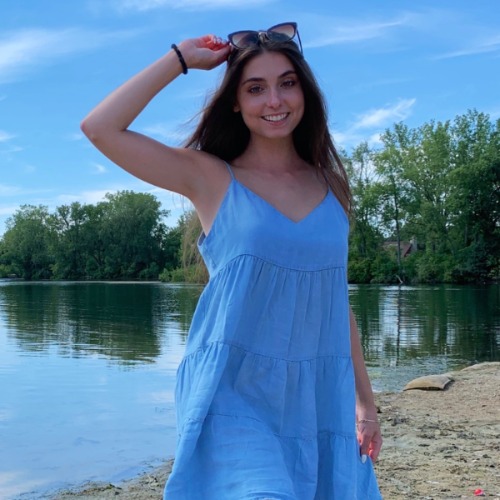
Hannah Sportiello
Wisconsin, USA
More Scleroderma Stories

Read More Scleroderma Stories

Follow Scleroderma United For More

